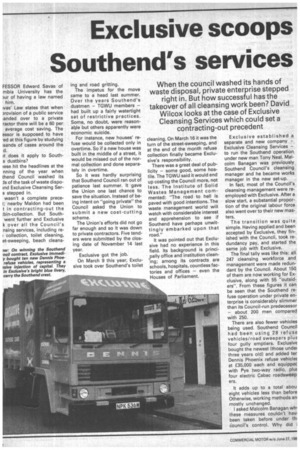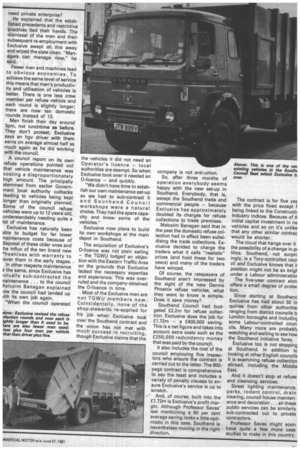Exclusive scoops Southend's services
Page 64

Page 65

If you've noticed an error in this article please click here to report it so we can fix it.
When the council washed its hands of waste disposal, private enterprise stepped right in. But how successful has the takeover of all cleansing work been? David Wilcox looks at the case of Exclusive Cleansing Services which could set a contracting-out precedent
FESSOR Edward Savas of mbia University has the )ur of having a law named him.
,vas' Law states that when )rovision of a public service anded over to a private ractor there will be a 60 per average cost saving. The essor is supposed to have 'ed at this figure by studying Isands of cases around the d. ing and road gritting.
The impetus for the move came to a head last summer. Over the years Southend's dustmen — TGWU members — had built up a fairly watertight set of restrictive practices. Some, no doubt, were reasonale but others apparently were economic suicide.
For instance, new houses' refuse would be collected only in overtime. So if a new house was built in the middle of a street, it would be missed out of the normal collection and done separately in overtime.
So it was hardly surprising that Southend Council ran out of patience last summer. It gave the Union one last chance to save the situation. Instead of being intent on "going private" the Council asked the Union to submit a new cost-cutting scheme.
The Union's efforts did not go far enough and so it was down to private contractors. Five tenders were submitted by the closing date of November 14 last year.
Exclusive got the job.
On March 9 this year, Exclusive took over Southend's toilet cleaning. On March 16 it was the turn of the street-sweeping, and at the end of the month refuse collection finally became Exclusive's responsibility.
There was a great deal of publicity — some good, some hostile. The TGWU said it would end up costing the Council more, not less. The Institute of Solid Wastes Management commented: "The road to hell is paved with good intentions. The waste management world will watch with considerable interest and apprehension to see if Southend have perhaps unwittingly embarked upon that road."
It was pointed out that Exclusive had no experience in this field. Its background is principally office and institution cleaning; among its contracts are schools, hospitals, countless factories and offices — even the Houses of Parliament. Exclusive established a separate and new company — Exclusive Cleansing Services — to run the Southend operation under new man Tony Neal. Malcolm Banagan was previously Southend Council's cleansing manager and he became works manager in the new set-up.
In fact, most of the Council's cleansing management were reemployed with Exclusive. After a slow start, a substantial proportion of the original labour force also went over to their new masters.
The transition was quite simple. Having applied and been accepted by Exclusive, they finished with the Council, took redundancy pay, and started the same job with Exclusive.
The final tally was like this: all 247 cleansing workforce and management were made redundant by the Council. About 150 of them are now working for Exclusive, along with 55 "outsiders". From these figures it can be seen that the Southend refuse operation under private enterprise is considerably slimmer than its Council-run predecessor — about 200 men compared with 250.
There are also fewer vehicles being used. Southend Council had been using 28 refuse vehicles/road sweepers plus four gully emptiers. Exclusive bought the newest (those unclet three years old) and added ter Dennis Phoenix refuse vehicles at £35,000 each and equippec with Pye two-way radio, plut four electric Cabac roadsweep ers.
It adds up to a total abou eight vehicles less than before Otherwise, working methods an mostly unchanged.
I asked Malcolm Banagan wh, these measures couldn't hay, been taken before under th, council's control. Why did
need private enterprise?
He explained that the established precedents and restrictive practices tied their hands. The dismissal of the men and their subsequent re-employment with Exclusive swept all this away and wiped the slate clean. "Managers can manage now," he said.
Fewer men and machines lead to obvious economies„ To achieve the same level of service this means that men's productivity and utilisation of vehicles is better. There is one less crew member per refuse vehicle and each round is slightly longer; there are now ten domestic rounds instead of 13.
Men finish their day around 3pm, not lunchtime as before. They don't protest; Exclusive says an hgv driver with them earns on average almost half as much again as he did working with the council.
A council report on its own refuse operations pointed out that vehicle maintenance was costing a disproportionately high amount. The principally stemmed from earlier Government local authority cutbacks leading to vehicles being kept longer than originally planned. Some of the council refuse vehicles were up to 12 years old, understandably needing quite a tot of maintenance.
Exclusive has naturally been able to budget for far lower maintenance costs because of iisposal of these older ones and
:he influx of the ten brand new
thoenixes with warranty to over them in the early stages. In other respects maintenance s the same, since Exclusive has ictually sub-contracted the naintenance . . to the council Aalcolm Banagan explained ow the council had landed up iith its own job again.
"When the council operated the vehicles it did not need an Operator's licence — local authorities are exempt. So when Exclusive took over it needed an 0-licence — and quickly.
"We didn't have time to establish our own maintenance set-up so we had to sub-contract it and Southend Council workshops were a natural choice. They had the spare capacity and knew some of the vehicles."
Exclusive now plans to build its own workshops at the main depot in Southend.
The acquisition of Exclusive's 0-licence was not plain sailing — the TGWU lodged an objection with the Eastern Traffic Area on the grounds that Exclusive lacked the necessary expertise and experience. This was overruled and the company obtained the 0-licence in time.
Most of the Exclusive men are not TGWU members now. Coincidentally, none of the shop-stewards re-applied for his job when Exclusive took over the Southend contract and the union has not met with much success in recruiting, though Exclusive claims that the company is not anti-union.
So, after three months of operation everybody seems happy with the new set-up in Southend. Everybody, that is, except the Southend trade and commercial people — because Exclusive has approximately doubled its charges for refuse collections to trade premises.
Malcolm Banagan said that in the past the domestic refuse collection had in effect been subsidising the trade collections. Exclusive decided to charge the traders what it calls "realistic" prices (and hold these for two years) and many of the traders have winced.
Of course, the ratepayers of Southend aren't impressed by the sight of the new Dennis Phoenix refuse vehicles, what they want to know is simple. Does it save money?
Southend Council had budgeted £2.2m for refuse collection. Exclusive does the job for £1.72m — a £400,000 saving. This is a net figure and takes into account extra costs such as the £250,000 redundancy money that was paid by the council.
It also includes the cost of the council employing five inspectors who ensure the contract is carried out to the letter. The BOOpage contract is comprehensive to say the least and includes a variety of penalty clauses to ensure Exclusive's service is up to scratch.
And, of course, built into the E1 .72m is Exclusive's profit margin. Although Professor Savas' law mentioning a 60 per cent average saving looks a little optimistic in this case, Southend is nevertheless moving in the right direction. The contract is for five yea with the price fixed except f being linked to the Constructi( Industry Indices. Because of tl initial capital investment in ne vehicles and so on it's unlike that any other similar contrac would be shorter.
The cloud that hangs over it the possibility of a change in pi litics. Southend, not surpri: ingly, is a Tory-controlled cow Gil and Exclusive knows that h position might not be so brig). under a Labour administratior
The five-year contract alon offers a small degree of protec tion.
Since starting at Southenc Exclusive has had about 50 in quiries from other authoritie: ranging from district councils tc London boroughs and includinc. some Labour-controlled coun cils. Many more are probabl) watching and waiting to see hovi the Southend initiative fares.
Exclusive too is not stoppinc at Southend. In addition tc looking at other English councih it is examining refuse collectior abroad, including the Middl( East.
And it doesn't stop at refusE and cleansing services.
Street lighting maintenance parks, rodent control, drair clearing, council house mainten ance and decoration ... all thesE public services can be similarl) sub-contracted out to privatE contractors.
Professor Savas might soor have quite a few more casE studies to make in this country




















































































































